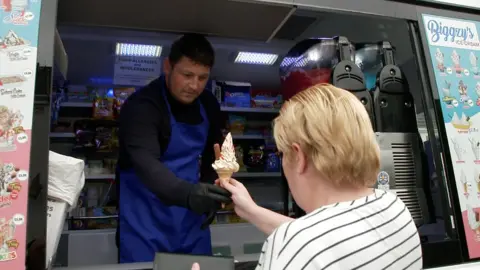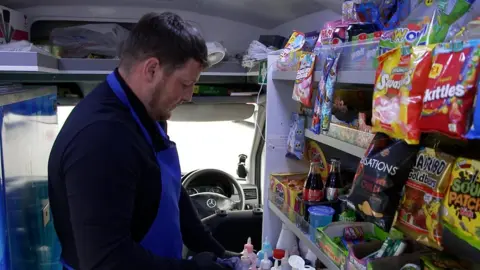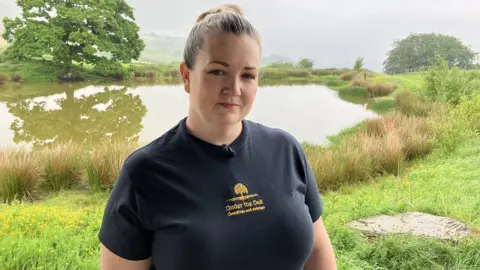Cost of living: Merthyr ice cream man freezes lolly sales
 BBC
BBCAn ice cream man is considering axing ice lollies because of the cost of freezing them.
Mark Biggs, from Merthyr Tydfil, runs Biggzy's Ice Cream and said there have been weeks he has not paid himself a wage.
Rising prices for electricity, diesel and wholesale food mean he is considering quitting the job he loves.
The UK government said it is "supporting British businesses to navigate the months ahead".
The Federation of Small Businesses said 11% of small firms plan to close, sell or downsize over the coming year, according to their research.
Mr Biggs used to be a mechanic and said his decision to "change oily rags for rags covered in ice cream" made him happy.
"I love this job, it's the best job I've had," he said.
"All I want to do is make people happy. I'm happy when I'm serving."

He said wanted this to be a "lifetime" job, but can't see that happening with the way prices are rising.
"It's upsetting when you think about it, it could be over."
Three days-worth of diesel for the van is costing him £120 and the fridges are charged from his home electricity supply.
He said he may have to remove ice lollies from the van, due to the cost of electricity of the additional fridge.
He is also paying suppliers more for ice cream mix and snacks.
"Everything costs way too much at the minute, I can't put my prices up because people moan if I put my prices up," he said.
He added that he takes home on average around £150 a week, but sometimes has no wage at all.

After the disruption of the pandemic, many working in leisure, hospitality and tourism are hoping for a good summer, but businesses face many difficulties.
This week, the RAC said it costs £98 to fill the average car with petrol and £101.86 with diesel.
The British Retail Consortium said shoppers are spending less than they were a year ago.
Customers 'reluctant to spend while our costs are escalating'
Hopkin Smith, of Taff Valley Activity Centre near Pontypridd, said corporate clients and local family day trips aren't as frequent as they used to be.

"What is worrying me is that the cost of fuel is going to go up again in the autumn, the stag and hens will have plateaued, and with gas and electricity prices going up, the family groups are going to be hit harder again," said Mr Smith.
"So while we're able to get through the summer, (by) the autumn, winter and next year I don't know where we'll be going.
"We're in a sort of Catch-22, reluctance from customers to spend while our costs are escalating all the time."
With foreign travel restricted, last year was a busy summer for Lydia Watts at Under The Oak glamping in Bedwas, near Caerphilly.
However, Ms Watts is expecting this season to be "challenging".

"It does seem that people are more wary about booking that big holiday, spending hundreds, getting away because the cost of fuel's gone up, their household bills have gone up and there does seem to be an air of uncertainty," said Ms Watts.
"People are maybe booking a little later, booking shorter stays, cutting back a little bit."
'Little or no financial support'
Sam Foulkes runs Wrexham's Rock The Park festival and said the cost of living is causing sales to drop.
"People cannot afford to go to events and festivals.
"They are worried about being able to have hot running water, a roof over their head and a light on in the dark," he said.
Mr Foulkes said the events industry is facing a tough time with "little or no financial support available."
 Rock The Park
Rock The Park Ben Cottam, from The Federation of Small Businesses Wales, said the UK and Welsh governments should offer "targeted interventions like grant support", similar to measures taken during the pandemic.
"We have called on UK government to extend the energy support issued via the council tax system to small businesses, as they are currently not protected by the energy price cap unlike domestic customers.
"We have also called on government to install a sick pay rebate, to allow breathing space for the smallest businesses."
Asked if pandemic-style business grants were part of the answer, Welsh government Economy Minister Vaughan Gething said he wanted to support business "in a way that helps them to move forward with their customer base".
"So it's both about putting money into the pockets of customers - that's why we've put money into advice services, it's why our £380m package of support for households really matters.
"But we've then got to think about how we use the opportunities to support businesses into the future."
He added that would need to involve the UK government and its "much larger fiscal firepower" to have a significant impact.
A UK government spokesman said: "We've cut taxes for hundreds of thousands of businesses by increasing the Employment Allowance and slashing fuel duty.
"We continue to support businesses with tax incentives like the Annual Investment Allowance and the super-deduction, the biggest business tax cut in modern British history as well as investing in skills, innovation and infrastructure to boost growth for the long-term."
- Wales Live, Wednesday at 22:35 and available on the iPlayer
